
PROGRAMS
One of the biggest hurdles in development of underprivileged masses is lack of employable skills among students and youths. Therefore, CDSA works with the communities on employable skills, entrepreneurship development and life skills that will give sustainable livelihood sources.
Skill up-gradation compatible to the updated global market trend
Increasing securities for livelihood through self-employment, small businesses, co-operatives, non-farms, off-farm and farm activities such as organic farming, small and medium scale industries and government schemes that will make masses as self-reliant i.e Atmanirbhar Bharat
Livelihood promotion through trainings, subsidies and implementation of exclusive and time bound schemes for the welfare and development of weaker section
Making use of available training provided by Government and Private sector
Personality Development i.e. Communication skills, English speaking and training to face interviews professionally
Train girls and young women to take up small scale entrepreneurship Making Available seed capital to start small ventures individually and in groups
Financial Inclusion- Financial inclusion is the one of the core programs of Centre for Development Studies and Action (CDSA). We believe that financial inclusion is essential for empowering weaker sections of the society.
Our Financial Inclusion Initiatives aim to bridge the gap between financial institutions and underserved populations, and hence enabling them to participate fully in the formal economy.
Our strategy is to promote financial literacy, creating awareness and facilitate basic financial services such as Zero balance savings accounts (Jan Dhan Yojana), (Know Your Customer) KYC documents, credit facilities, insurance products, and remittance services.
We work closely with banking institutions, microfinance organizations, and cooperative societies to expand their outreach to marginalized communities, especially women and persons with disabilities
CDSA believes Education is an emancipatory tool which people have received. Amongst many this is one of most important to bring about revolutionary changes in the life of people. CDSA not only advocates for universal and free primary education but also emphasis on technical, higher and professional education for all so that people can be self-reliant permanently.
Sensitising and developing awareness about educational opportunities in India and Abroad.
Providing study materials, scholarships, awards for creating favorable environment both for girls and boys.
Assisting with all the possible measures to educate students till highest level (professional and higher education).
Awareness about government courses and programs through career guidance workshops.
Personality development and Soft Skills training.
Health is the most neglected area in any poor community. Due to poverty people are always insecure and in worry of survival on daily basis. In this insecurity and poor condition health always remains the lowest priority.
Overwhelming majority of Indian women are anemic. Amongst rural societies and urban slums there are very high rates of child mortality, infant mortality and maternal mortality. Global Pandemic of Covid 19 has posed further challenges in health sector. In this context health is very important sector that should be given prime importance however on the multidimensionality of health deprivation amongst women in particular is an area unexplored.
Spreading awareness especially amongst women and children about health and hygiene through health camps, sessions, campaign, health drives, etc.
Enabling state hospitals, municipal corporations, local bodies, health workers to pay special attention to women, children’s health as issue of development of country
Awareness generation and campaign for realizing health rights is one of the most important and basic human rights.
One of the most excluded and discriminated people are Person with Disabilities (PwD). They face discrimination at all walks of life. Given opportunity, they can lead dignified and productive life. CDSA is dedicated to work for improving the quality if life of PWD by advocating for their rights, ensuring inclusion in mainstream society keeping up with national and international human right spirit. Our goal is to enhance the physical, cognitive, and socio-economic well-being of PwD, empowering them to lead fulfilling lives.
Our efforts focus on promoting accessible infrastructure, information, and communication technologies to facilitate independent living and full societal participation for PwD.
Collaborate with healthcare professionals, rehabilitation centers, and community-based organizations to deliver essential healthcare services, assistive devices, therapies, and referrals.
Advocate for inclusive education policies and provide support for PwD to access mainstream schools, special education programs, and vocational training.
Livelihood and educational programs for PwD.
There is a good budgetary provision for the welfare and development of weaker sections under various government schemes such as Micro, Small and Medium Enterprises (MSME), Women and Child Development, Youth Affairs, Minority Affairs Scheduled Caste Sub Plan (SCSP) and Tribal Sub Plan (TSP), etc. at national and state level. Despite government interventions, Corporate Social Responsibilities (CSR) invest several resources, however, the ground realities show very limited improvement in the socio-economic status and situation of weaker sections. This is due to corruption and a lack of good governance. Thus CDSA monitors schemes and their impact on the ground to help government and CSR to focus on the empowerment of weaker sections. CDSA with its ideology of responsibility and ownership wants to generate empirical and theoretical research, documentation for social and economic empowerment, and solving real-life issues of the people.
Monitoring and evaluation of various government and CSR interventions for livelihood promotions.
Research, publications, and Advocacy on livelihood promotion.
Developing state and national-level networks of academicians, practitioners, and state and civil society actors on the issues affecting weaker sections.
